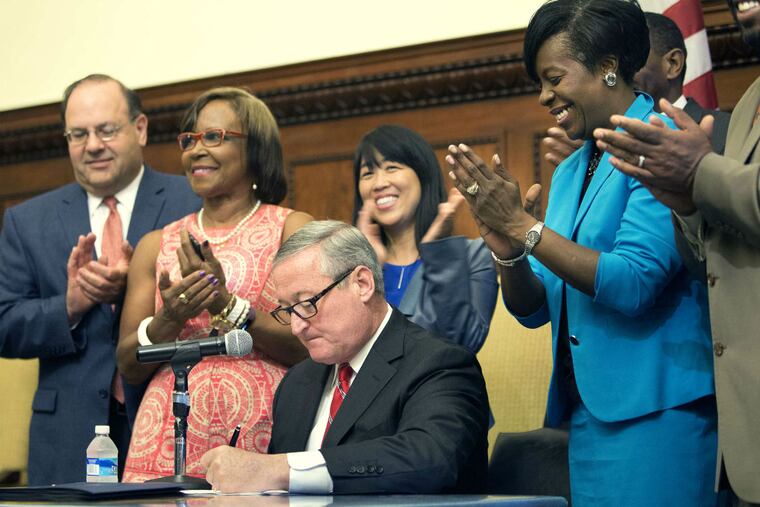City rolls out 'soda tax' enforcement plan
The hundreds of distributors who sell sweetened beverages to Philadelphia businesses need to register with the city before Jan. 1 to be in compliance with a new tax, city officials announced Friday.

The hundreds of distributors who sell sweetened beverages to Philadelphia businesses need to register with the city before Jan. 1 to be in compliance with a new tax, city officials announced Friday.
The city launched a website, www.phillybevtax.com, where distributors need to register. The website also offers information on the tax for both distributors and the retailers who purchase and sell beverages.
The sweetened beverage tax, often referred to as the soda tax, adds 1.5 cents per ounce to the cost of most sugary and diet beverages. The tax, which goes into effect Jan. 1, is applied at the distributor level. The first tax bill is due Feb. 20.
Mayor Kenney sought the tax to pay for expanded early-childhood education and a number of other initiatives. The tax is expected to generate about $92 million a year.
The tax immediately faced criticism from the beverage industry. A group of industry associations, Philadelphia businesses, and residents filed a lawsuit against the city over the tax, arguing it is unconstitutional.
Common Pleas Court Judge Gary S. Glazer is reviewing the lawsuit. He vowed to make a ruling before Jan. 1.
On Friday, Kenney said his administration is moving forward with the tax, despite the pending lawsuit.
"We believe we have a solid case," Kenney said at a news conference Friday. "We are moving forward because our children can't wait."
Kenney said the city will add 2,000 prekindergarten seats in January. Those seats are expected to be paid with the beverage tax revenue.
City spokesman Mike Dunn said the city was confident it will win and "anything beyond that is hypothetical." He declined to say how the city would fund pre-K if the tax is struck down by the court.
Revenue Commissioner Frank Breslin said Friday that city officials will be doing outreach to the various businesses in the city that sell sweetened beverages. Those retailers must buy from distributors who have registered with the city's sweetened beverage tax program. If not, the retailer would be on the hook for the tax.
Anthony Campisi, spokesman for the Philadelphians Against the Grocery Tax coalition, which opposes the tax, said that the outreach efforts "don't change the fact that this onerous tax will hurt working families and small, family-owned businesses by drastically raising the prices of more than a thousand products, including soft drinks and teas, as well as no-calorie and low-calorie options."
The tax is to be paid monthly through the city's new beverage tax website. Though the tax is self-reported, distributors must keep copies of invoices for six years, said Marisa Waxman, deputy revenue commissioner.
Waxman said the city estimates there are about 1,000 distributors that sell beverages to Philadelphia businesses.
Distributors will be fined $1,000 per untaxed invoiced sale. Plus, they will have to pay the skipped tax, Kenney said.
The tax applies to any distributor, even those outside of the city and state, that sell sweetened beverages to a Philadelphia business.
The city plans to enforce the tax by selecting stores randomly and checking invoices to determine the source of taxable sweetened beverages. City auditors would check the distributors against the registration list.
If the retailer did not pay the tax nor purchased the beverages from a registered distributor, that business would be fined and liable for the tax. If the retailer purchased from a registered distributor that did not pay the tax, that distributor then would be on the hook for the tax and the penalties.
"As with all tax delinquencies, enforcement actions may include placement with a collection agency, filing a judgment, and closure of the business," Dunn said.
215-854-5520 @InqCVargas